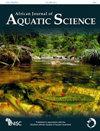非洲乳液系统中基于大型无脊椎动物的生物评估方法的批判性综述:发展、挑战和法律要求
IF 1
4区 环境科学与生态学
Q3 MARINE & FRESHWATER BIOLOGY
引用次数: 4
摘要
在世界范围内,水资源对所有形式的生命都有影响,因为生态系统是连接水资源和土地的网络。它们对航海、供水、农业、娱乐和工业发展至关重要,有助于调节气候变化,支持社会、精神、教育和生态系统健康服务。然而,这些生态系统面临着自然和人为的双重威胁。人为威胁是由人口增长、经济发展和流域退化驱动的。它们现在是世界上最受威胁的资源,特别是在非洲。为了设计适当的管理策略,必须正确诊断威胁的原因和影响。监测和评估方法必须显示退化情况并随着时间的推移将其综合起来,以便产生水管理人员决策所需的数据和信息。在这方面,利用大型无脊椎动物进行生物监测是一种有效的工具,因为它综合了退化的原因和水生生物对其影响的反应。本综述总结了非洲生物监测的需求、挑战和法律影响,以成功开展生物监测的国家的经验教训为基准。本文章由计算机程序翻译,如有差异,请以英文原文为准。
A critical review of macroinvertebrate-based bioassessment approaches in Africa’s lotic systems: developments, challenges, and legal requirements
Worldwide, water resources have an impact on all forms of life as lotic systems are networks that interconnect water resources and land. They are important for navigation, water supplies, agriculture, recreation, and industrial development and help to regulate changes in climate and support social, spiritual, educational, and ecosystem health services. These ecosystems are, however, facing both natural and anthropogenic threats. Anthropogenic threats are driven by population increase, economic development, and catchment degradation. They are now the most threatened resources worldwide, and in Africa in particular. To design proper management strategies, the causes and impacts of the threats must be properly diagnosed. Monitoring and assessment approaches that show degradation and integrate it over time are essential to generate data and information required by water managers for decision making. Biomonitoring using macroinvertebrates is an effective tool in this regard, because it integrates causes of degradation and aquatic biotic responses to the impacts thereof. This review summarises the needs, challenges, and legal implications of biomonitoring in Africa using lessons from countries with successful biomonitoring as benchmarks.
求助全文
通过发布文献求助,成功后即可免费获取论文全文。
去求助
来源期刊

African Journal of Aquatic Science
MARINE & FRESHWATER BIOLOGY-
CiteScore
3.90
自引率
7.10%
发文量
31
审稿时长
>12 weeks
期刊介绍:
The African Journal of Aquatic Science is an international journal devoted to the study of the aquatic sciences, covering all African inland and estuarine waters. The Journal publishes peer-reviewed original scientific papers and short articles in all the aquatic science fields including limnology, hydrobiology, ecology, conservation, biomonitoring, management, water quality, ecotoxicology, biological interactions, physical properties and human impacts on African aquatic systems.
 求助内容:
求助内容: 应助结果提醒方式:
应助结果提醒方式:


